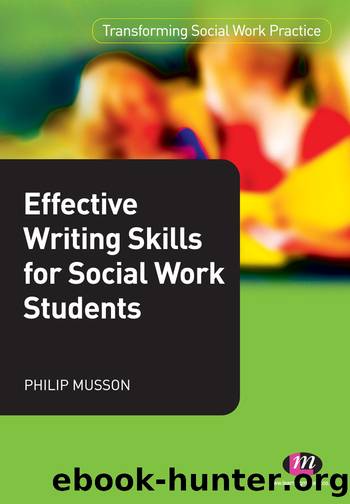Effective Writing Skills for Social Work Students by Philip Musson

Author:Philip Musson [Musson, Philip]
Language: eng
Format: epub
Tags: Nonfiction, Social & Cultural Studies, Social Science, Social Work
ISBN: 9780857254184
Publisher: SAGE Publications
Published: 2011-06-17T04:00:00+00:00
CASE STUDY
Jayne started her level two practice placement at a family centre in an urban area of a large city. She was looking forward to her placement though she was a little apprehensive as this was her first placement and she was not familiar working with the client group. Her PE also worked in the family centre and was very experienced working with families. The learning agreement meeting took place and Jayne settled in.
Initially she undertook some supervised contact, attended a parenting group, and began work on a parenting assessment. She enjoyed the direct work with children, she knew she had ability in communication with children and was relaxed in their company. Working with some of the parents she found much more challenging. There was one whom she found quite intimidating and with whom she was supposed to be undertaking a parenting assessment. This service user had seemed angry and aggressive on their second session and at one point had called into question Jayneâs knowledge and experience, saying she was young enough to be her daughter and enquired if she had any kids herself, to which Jayne had said no, to which the mother replied, âWell what do you know?â Jayne had not known what to say. She felt embarrassed about this encounter and did not tell anyone about it, but it left her feeling undermined and doubting her abilities. She felt sick at the prospect of working with this mother and cancelled the next appointment so as to avoid the situation. It was not as bad with other service users, some of whom she got on well with, but this was a significant piece of work and she did not say anything to her PE as she thought it would look bad and go against her, even though in her heart of hearts she knew her denial was only compounding the problem.
In supervision Jayneâs PE enquired how the parenting assessment was going, to which Jayne replied that she was working on the childâs developmental needs (this was in part true, as she was comfortable working with the child; it was the parenting capacity section that she was avoiding). Mary, Jayneâs PE, asked to see a draft of the parenting assessment at the next session. At the following supervision session Jayne presented the draft assessment which comprised solely an assessment of the childâs developmental needs despite Jayne having had the case for three weeks. Mary asked if there was a reason for the lack of progress and Jayne tearfully admitted to what had happened.
Mary was sympathetic but disappointed that Jayne had not shared this problem with her earlier, after the altercation in fact. Mary said she would have to discuss it at the mid-point review to be held the following week as she was concerned that the problem was not addressed, which brought into question Jayneâs professional accountability. At the review it was agreed that Jayne would be supported to complete the parenting assessment, and that Mary would have to
Download
This site does not store any files on its server. We only index and link to content provided by other sites. Please contact the content providers to delete copyright contents if any and email us, we'll remove relevant links or contents immediately.
The Mind Map Book by Tony Buzan(2081)
Critical Thinking Skills For Dummies by Martin Cohen(1149)
Court Officer Exam by Learning Express LLC(1062)
Master the Civil Service Exams by Peterson's(1054)
Cracking the GRE Premium Edition with 6 Practice Tests, 2017 by Princeton Review(908)
How to Become a Straight-A Student by Cal Newport(896)
Cracking the GRE Premium Edition with 6 Practice Tests, 2020 by The Princeton Review(824)
The Big Short: Inside the Doomsday Machine by Michael Lewis(811)
Cracking the GRE with 4 Practice Tests, 2020 Edition by The Princeton Review(786)
Design For How People Learn (Eva Spring's Library) by Julie Dirksen(751)
Cracking the GRE, 2013 Edition by Princeton Review(641)
A Mind For Numbers by Barbara Oakley PhD(633)
Easy Pre-Calculus Step-by-Step by Carolyn Wheater(632)
English Verbs by Collins(623)
The Complete Idiot's Guide to Speed Reading by Abby Marks Beale; Pam Mullan(572)
Cracking the GRE Premium Edition with 6 Practice Tests, 2019 by Princeton Review(565)
The Gift by V.S. Morgan(512)
Cracking the GRE Premium Edition with 6 Practice Tests, 2015 by The Princeton Review(497)
How to Succeed in College (While Really Trying) by Jon B. Gould(467)
